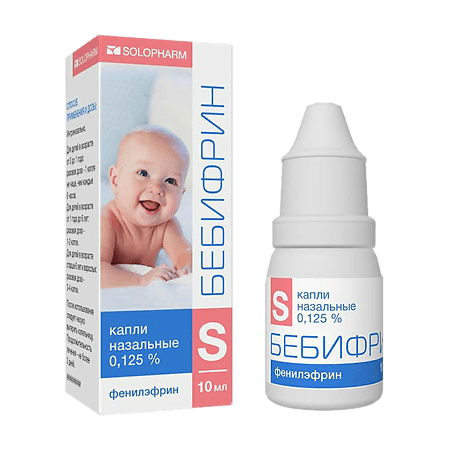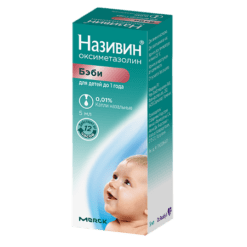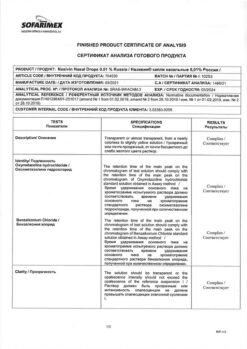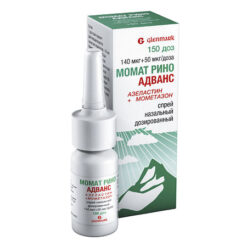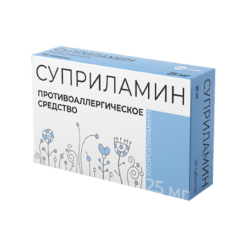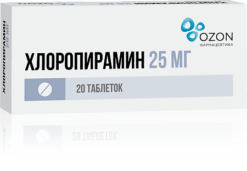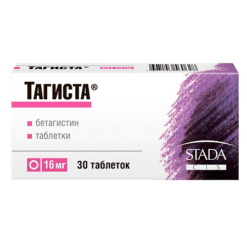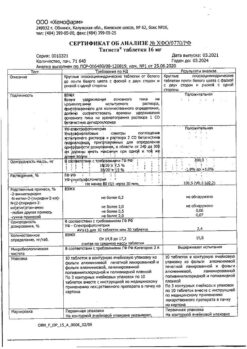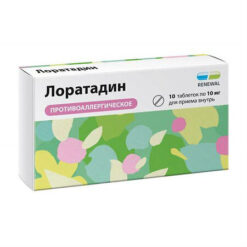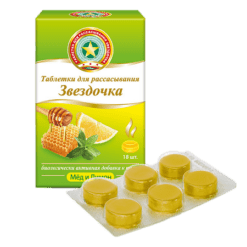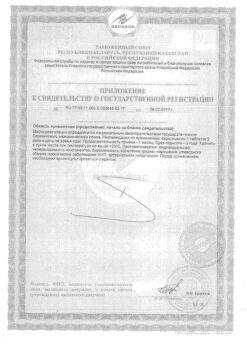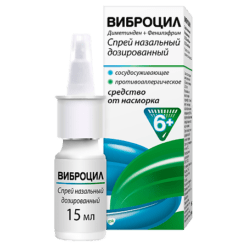No products in the cart.
Bebifrin, drops 0.125% 10 ml
€6.00 €5.00
Description
An anticonvulsant agent – alpha-adrenomimetic.
ATX code: R01AA04 Pharmacological properties
Pharmacodynamics
The drug for symptomatic local treatment of rhinitis. Phenylephrine hydrochloride is an agonist of alpha 1-adrenergic receptors (sympathomimetics) which produces vasoconstrictor effect due to stimulation of alpha1-receptors in the nasal mucosa, it reduces mucous membrane swelling and hyperemia of tissues, congestion in the nasal mucosa and improves nasal airway patency.
The restoration of nasopharyngeal airflow makes the patient feel better and reduces the risk of possible complications from mucociliary congestion.
Pharmacokinetics
In topical administration, systemic absorption is low.
Indications
Indications
Symptomatic treatment: to facilitate breathing through the nose in case of colds, flu, hay fever or other allergic diseases of the upper respiratory tract, accompanied by acute rhinitis or sinusitis.
Pharmacological effect
Pharmacological effect
Anticongestant – alpha adrenergic agonist.
ATX code: R01AA04
Pharmacological properties
Pharmacodynamics
A drug for the symptomatic local treatment of rhinitis. Phenylephrine hydrochloride is an alpha1-adrenergic receptor agonist (sympathomimetics that have a vasoconstrictor effect due to stimulation of alpha1 receptors in the mucous membranes of the nasal cavity, reduces swelling of the mucous membranes and tissue hyperemia, congestion in the nasal mucosa, and also improves the patency of the nasal airways.
Restoring air patency of the nasopharynx improves the patient’s well-being and reduces the risk of possible complications caused by stagnation of mucous secretion.
Pharmacokinetics
When applied topically, systemic absorption is low.
Special instructions
Special instructions
Use in children
The use of the drug is contraindicated in children under 2 months of age. Use with caution in children under 6 years of age.
Active ingredient
Active ingredient
Phenylephrine
Composition
Composition
1 ml of the drug contains:
Active ingredient:
Phenylephrine hydrochloride 1.25 mg
Excipients:
Benzalkonium chloride 0.18 mg
Glycerol anhydrous 50.00 mg
Macrogol 1500 (polyethylene glycol 1500) 15.00 mg
Sodium hydrogen phosphate dihydrate 2.26 mg
Potassium dihydrogen phosphate 1.01 mg
Disodium edetate dihydrate (trilon B) 0.20 mg
Water for injections up to 1 ml.
Pregnancy
Pregnancy
There is no sufficient experience with the use of the drug during pregnancy.
It can be used for the treatment of pregnant and nursing mothers as prescribed by the attending physician, if the potential benefit to the mother outweighs the possible risk to the fetus or child.
Contraindications
Contraindications
increased individual sensitivity to the components of the drug;
severe uncontrolled arterial hypertension;
acute cardiovascular diseases;
tachyarrhythmia;
severe hyperthyroidism;
conditions after transsphenoidal hypophysectomy;
atrophic rhinitis;
simultaneous use of MAO inhibitors (as well as 2 weeks after their withdrawal);
inflammation of the skin and mucous membrane of the vestibule of the nose;
children up to 2 months.
With caution
Children’s age (up to 6 years); angle-closure glaucoma; diseases of the cardiovascular system (including coronary sclerosis, angina pectoris), arterial hypertension, diabetes mellitus, thyroid diseases. In such cases, it is recommended to consult a doctor.
Side Effects
Side Effects
Local reactions: burning sensation, tingling or tingling in the nose, irritation of the mucous membranes of the nasal cavity.
Systemic effects: headache, dizziness, palpitations, arrhythmia, increased blood pressure, sweating, pallor, tremor, sleep disturbance. Benzalkonium chloride, which is part of the drug, can cause irritation of the nasal mucosa.
Interaction
Interaction
It is not recommended to use phenylephrine concomitantly with other decongestants (regardless of the route of administration) or with antihypertensive drugs.
MAO inhibitors (procarbazine, selegiline), tricyclic antidepressants, maprotiline, guanadrel, guanethidine enhance the vasoconstrictor effect and arrhythmogenicity of phenylephrine (with systemic absorption).
Concomitant use of phenylephrine simultaneously or within 14 days after treatment with MAO inhibitors may enhance the pressor effect.
Thyroid hormones during systemic absorption of phenylephrine mutually increase the associated risk of coronary insufficiency (especially in coronary atherosclerosis).
It is not recommended to use phenylephrine concomitantly with linezolid.
Overdose
Overdose
There are no data on drug overdose.
Potentially possible symptoms (with systemic absorption): ventricular extrasystole, short paroxysms of ventricular tachycardia, a feeling of heaviness in the head and limbs, excessive increase in blood pressure, agitation, paranoia, hallucinations, nausea, vomiting.
Treatment: intravenous administration of short-acting alpha-blockers (phentolamine) and beta-blockers (for rhythm disturbances).
Storage conditions
Storage conditions
Store at a temperature not exceeding 25 °C.
Keep out of the reach of children.
Shelf life
Shelf life
Shelf life – 2 years. Do not use after the expiration date.
Shelf life after opening the bottle is 1 month.
Manufacturer
Manufacturer
Grotex LLC, Russia
Additional information
| Shelf life | 2 years. Do not use after the expiration date! |
|---|---|
| Conditions of storage | Store at a temperature not exceeding 25 ° C. Keep out of reach of children. |
| Manufacturer | Grotex Ltd, Russia |
| Medication form | nasal drops |
| Brand | Grotex Ltd |
Related products
Buy Bebifrin, drops 0.125% 10 ml with delivery to USA, UK, Europe and over 120 other countries.

